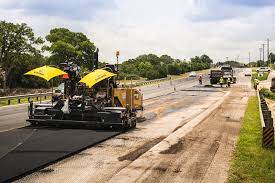
If there’s one industry that could make unexpected gains as a result of President Biden’s $2.2 trillion infrastructure plans, it would be the asphalt industry. Some in Oklahoma could stand to profit from the highway projects, if they are ever approved by congress.
One particular company that stands out is Blueknight Energy Partners headquartered in Tulsa. As its own website points out, the company operates the largest independently owned network of asphalt terminals across the U.S…..53 of them in 26 states. On a combined basis, they have more than 8.7 million barrels of liquid asphalt and residual fuel oil storage capacity.
What Blueknight does is provide asphalt terminalling services to refiners, marketers and distributors of liquid asphalt and asphalt-related products. In short, its business could swell as a result of Biden’s earmarked $115 billion for roads and bridges.

While Blueknight did not respond to a request for comments about the potential of increased demand for its asphalt products, the company in recent months turned stronger emphasis on the asphalt industry.
On March 1, 2021, the company finalized its exit from the crude oil terminalling business, selling its segment to Enbridge, Inc. in a $132 million deal. Blueknight had already sold its crude oil pipeline and trucking segments with closings in February 2021.
The combined sales totaled $164 million.
As the company stated last month, the moves strategically positioned the partnership “as a pure-play terminalling company focused on infrastructure and transportation end-markets.
Get that? Infrastructure. Just what Biden pointed to in his massive and costly program.
“Exiting our crude oil businesses has been a top priority for Blueknight since early 2020,” said Andrew Woodward, Chief Executive Officer said in completing the exit from the crude oil end of the firm’s business operations.
“Now with a more focused strategy and business model, coupled with an improved leverage profile and available liquidity, we believe we are well-positioned to identify and capture growth opportunities and benefit from long-term positive investment trends in U.S. infrastructure.”

As pointed out nationally, the biggest benefit for refiners could be an anticipated increase in demand for asphalt to repair crumbling highways and pave new ones. Asphalt comes from the heaviest and most-dense material in a barrel of crude.
So some analysts and industry observers predict Canada’s oil-sands producers could be big winners, since the country is the source of some of the world’s thickest petroleum. The tar-sands oil, as it’s described was supposed to be carried down the Keystone XL pipeline but Biden axed that project by rejecting its State department permit.
Still, some believe the heavy crude from Western Canada could be on the verge of a rebound.
“The asphalt industry should be elated with Biden’s plan to upgrade 20,000 miles of roads in the U.S.,” Charles Kemp, a senior consultant at Baker & O’Brien Inc. told Bloomberg.
“However, this announcement favors heavier oil production from outside of the U.S., which contains roughly double the amount of asphalt versus the asphalt content in light crudes from U.S. domestic production.
OK Energy Today reached out to the Oklahoma Asphalt Pavement Association. It did not respond.





